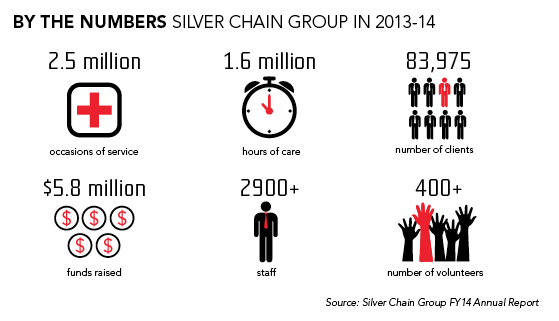A strong relationship between the chairman and its chief executive officer was the thread that helped the Silver Chain Group flourish, writes Tony Featherstone.
Silver Chain Group, a textbook example of a merger in the not-for-profit (NFP) sector, reinforces a powerful governance truth: the chairman/chief executive (CEO) relationship is an organisation’s most important, and the beating heart of its mission, values and culture.
Silver Chain chairman Anne Skipper AM FAICD and CEO Chris McGowan GAICD came together through the 2011 merger of Silver Chain and Royal District Nursing Service (RDNS) South Australia. Working closely with McGowan, Skipper, then chair of RDNS, formed a new board for the combined entity.
Much was at stake. Both organisations had proud history: RDNS started before Australia’s federation and Silver Chain not long after.
Both were well known in their communities, and played a vital role helping the elderly. Also, no merger is easy and history shows more fail than succeed. NFP mergers can have added complications because of legal structures.
Three years later, Silver Chain is performing well in a difficult market. Revenue was $225.9 million in 2013-14, and there was an $849,000 surplus compared to an $8.1 million deficit a year earlier.
The Western Australia-based organisation continues to expand on the east coast and is now one of this country’s largest in-home and care providers, helping more than 80,000 people each year.
Skipper gives several factors for the merger’s success. “From day one we wanted the merger to be that of equals, even though Silver Chain was several times larger than RDNS, and to take the best from each organisation. We also had directors and staff who, selflessly, were willing to stand aside if it was in the best interests of the new organisation and the people it serves.”
Skipper adds: “There was just this common purpose between Silver Chain and RDNS and an absolute commitment to make the merger work. I focused on getting the board structure right and the cultural integration of the two organisations. Chris focused on strategy and operations. We spoke a lot about “is it working” and what is the “new way” – not the Silver Chain or RDNS way, but the Silver Chain Group way. We were conscious of language.”
A commitment to strategy was equally critical. McGowan led a comprehensive strategic review soon after joining Silver Chain in 2007 and has just embarked on the next five-year plan. “We spent 18 months getting our strategic plan right,” he says. “Investing that amount of time and effort entrenches a foundation that guides an organisation’s thinking. It also promotes stronger alignment between the board and executive team.”
Strategic clarity also informs and maintains Silver Chain’s culture, says McGowan. “Our strategy provided a really strong narrative for the merged organisation, from the board to staff and volunteers. Everybody at Silver Chain knows the strategy. It has almost become a language of its own.”
McGowan says a strong culture helps Silver Chain stay true to its mission. “It’s a myth that NFP organisations aren’t focused on returns. We are very focused on cost control and maximising the health and well-being return on each dollar we spend. But our purpose is about improving the lives of the people we help.
When looking at new opportunities, we ask: how will it impact on our values, value proposition, brand and reputation? The board is great on this: they really understand the mission and walk the talk when it comes to what we will and won’t do.”

A working partnership
Skipper and McGowan are quick to deflect praise to Silver Chain’s 2,900 staff and 400 volunteers, but it is clear their working relationship was vital to its success. They did not know each other well before the merger and came from different organisations. The new organisation would never have worked without a vibrant chairman/CEO relationship.
It began, McGowan says, with mutual recognition of the role of chairman and CEO. “Anne’s view of the role of the CEO, and my view of the role of chairman, are very similar. I expect Anne to govern Silver Chain well and she expects me to lead it competently. There’s no blurring of our roles. We each have a job to do.”
Having a CEO who values the board and sees them as a resource rather than a handbrake also helps. Says McGowan: “I need directors who understand healthcare policy and delivery, and who I trust, work well with, and want to be challenged by. The Silver Chain board is a strong resource for management and something we draw on as needed.”
Skipper says trust and respect also inform the chairman/CEO relationship. “Chris and I don’t always agree on issues. But we have a way of coming together to find a consensus, or we ask other directors or executives for another opinion. We also have a very open working relationship. There are no surprises. Sharing the same value set is a strong fundamental for the relationship.”
Skipper and McGowan are not resting on Silver Chain’s post-merger gains. Silver Chain expanded its east coast services in 2014 by starting the hospital-in-the-home service in Brisbane’s north and on the Sunshine Coast, as well as a palliative care service in eight local health districts in Sydney and rural New South Wales. Two east coast-based directors joined the board.
Skipper says Silver Chain is preparing for further board renewal and succession planning in the next few years, to ensure the board’s composition is aligned with the evolving strategy.
McGowan believes using technology to help the elderly stay in their home longer is key to improving health outcomes in an ageing population.
He wants Silver Chain to provide equal or better healthcare services than public facilities at sharply lower cost and for the elderly to feel dignified in their home, rather than go to an aged-care facility. “In terms of our performance scorecard, first and foremost we have to create real value in the lives of people we serve by keeping people in their home as long as possible,” McGowan says.
Latest news
Already a member?
Login to view this content


